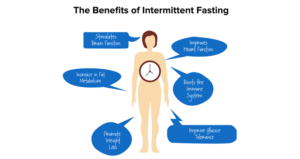IS INTERMITTENT FASTING THE NEXT BIG WEIGHT LOSS FAD?
 4 Jul, 2018
4 Jul, 2018
In this week blog, our heath coach Morena Magnanini, explains why Intermittent fasting is one of the simplest strategies that can help you lose fat, gain muscle and live healthy.
This isn’t a diet, it’s a lifestyle change. (1) That’s an important distinction. When you go on a diet, you eventually go off it, and usually return to your old habits that made you overweight and less healthy in the first place. Lost weight returns, blood pressure goes back up, and so on. But when you make lasting changes to your behavior, the benefits of those changes can continue.
What is Intermitted fasting? (2)
Intermittent fasting — alternating between periods of eating and fasting during the week —According to many in the health and fitness field, is on the edge of becoming the latest weight loss fad. A book called The Fast Diet, it is probably a very detailed beginner’s guide written by a medical doctor, Michael Mosley.
Some nutritionist, trainers recommend fasting every day for up to 16 hours and consuming food only during a short “eating window.” Others suggest going without food once or twice a week for 24-hour periods — having dinner one night, for example, and skipping breakfast, lunch and snacks the next day, then eating a normal dinner.
But getting people to eat healthier is difficult enough. Getting people to stop eating altogether for stretches of up to 24 hours? Yeah, not that easy!
Does it work for weight loss?
Of course, when it comes to weight loss, there are few absolutes, suggests Dr. Stephen Freedland, associate professor of urology and pathology at the Duke University Medical Center in Durham, North Carolina.
Caloric restriction, has been shown in research to produce many health benefits, says Freedland. Reducing obesity alone could prevent or slow the progress of a number of diseases, including cancer. The goal is to reduce what he calls “total caloric intake.” If someone can fast two days a week and then eat normally for the other five days, that goal could be achieved. Yet data on fasting suggest that people who practise periodic intense caloric restriction tend to overeat later.
In fact, the actual act of dieting is very difficult because you still have to eat every day. So, every couple of hours you are making a decision about food
On what we see with our clients here at Wind of Change is that a more sensible approach, might be helpful to compensate for the occasional indulgence by eating slightly less during the remainder of the week. “You want to have cake on Friday night because it’s your birthday? Have the piece of cake. Just eat slightly less the other six days to compensate. That’s very reasonable.
Can Fasting have side effects?
Yes, possibly. If one already has a diet poor in vitamins and protein, eating less food could lead to vitamin deficiency and muscle loss. Of course, this can be offset by taking multivitamins and doing strength training. Fasting can also lead to malnourishment if taken to an extreme. Also fasting can elevate cortisol levels, and one of the cortisol’s side effects is that raises blood sugar. A no, no for people with Type 1 and 2 Diabetes, and Metabolic Syndrome.
So, what are the benefits of Intermitted Fasting? (3)
- Weight Loss:Intermittent fasting can help you lose weight and belly fat, without having to consciously restrict calories. Insulin resistance:Intermittent fasting can reduce insulin resistance, lowering blood sugar by 36% and fasting insulin levels by 20-31%. This should protect against type 2 diabetes.
- Inflammation:Some studies show reductions in markers of inflammation, a key driver of many chronic diseases.
- Heart Health:Intermittent fasting may reduce LDL cholesterol, blood triglycerides, inflammatory markers, blood sugar and insulin resistance. These are all risk factors for heart disease.
- Cancer:Animal studies suggest that intermittent fasting may help prevent cancer. Brain Health:Intermittent fasting increases a brain hormone called BDNF, and may aid the growth of new nerve cells It may also protect against Alzheimer’s disease
- Anti-aging:Intermittent fasting can extend lifespan in rats. Studies showed that fasted rats live as much as 36-83% longer. *Please consult your doctor or your health practitioner before giving intermittent fasting a try. Have patience with it for at least a few weeks and see what happens. If you’re not feeling better, or if you’re feeling worse, stop. If you’re experiencing benefits, that’s great, keep it up
References: * Nandi. 2018. ABOUT INTERMITTENT FASTING: POSSIBLE BENEFITS AND HOW TO TRY IT. [ONLINE] Available at: https://askdrnandi.com/intermittent-fasting-possible-benefits-try/. [Accessed 25 June 2018]. * Roger Collier. 2018. Intermittent fasting: the next big weight loss fad. [ONLINE] Available at: https://www.ncbi.nlm.nih.gov/pmc/articles/PMC3652955/. [Accessed 25 June 2018]. * Jay Davidson. 2018. INTERMITTENT FASTING: WHAT ARE THE BENEFITS ?. [ONLINE] Available at: http://drjaydavidson.com/intermittent-fasting-benefits/. [Accessed 25 June 2018].

How Healthy are You?
Get a picture of your current health status and habits by taking our short Health and Wellbeing Check!